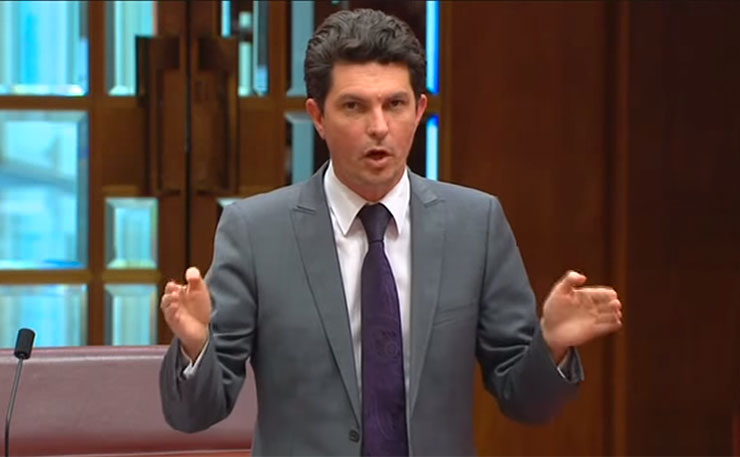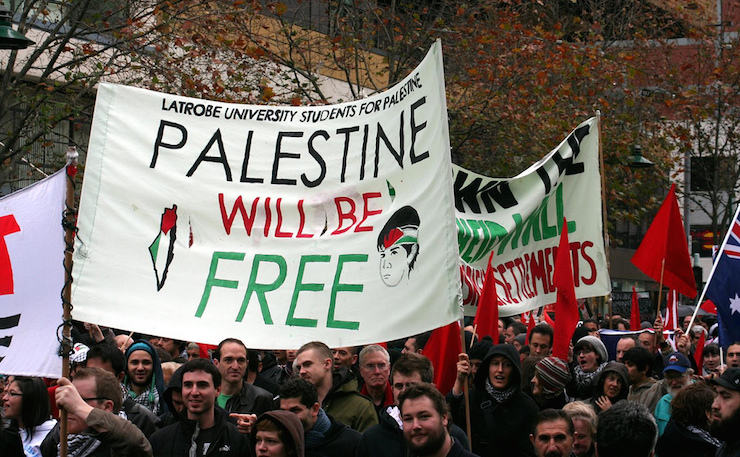The Greens get it right – and a little bit wrong – on the question of Israel, writes Michael Brull, in the first of a two part series.
Last week, the Greens revisited the question of Israel and Palestine. Benny Gantz, the former Chief of General Staff of the Israeli army was touring Australia.
Greens spokesperson on Foreign Affairs Senator Scott Ludlam rose in the Senate to propose a motion on the issue.
In the hostile environment of the Senate, Ludlam got about a minute and a half to explain why the Greens motion should be discussed.
Before Ludlam was able to say anything about the motion, Liberal Senator Zed Seselja yelled out that this was “Anti-Semitic, anti-Israel rubbish.” Ludlam observed that the “UN Conference on Trade and Development late last year identified that Gaza would be uninhabitable by 2020 as a result of the serial assaults by the Israel Defense Forces on the people of Gaza City. The very least that the Australian government could do would be to make some comments, or allow a vote in this chamber, on the visit of this individual to Australia, should they have seen fit to issue him with a visa.”
As Ludlam tried to express disappointment at something, his time ran out.
Ludlam’s brief comments contained some minor errors, and important truths. His comment about the UNCTAD report was correct. You can read it here (PDF). Paragraph 43 observes:
In the face of a severe housing crisis and the need for the construction of tens of thousands of housing units, as well as hundreds of new schools, the blockade continues to create an artificial scarcity of construction materials. This renders new construction projects either impossible or overly expensive to the impoverished population. The social, health and security-related ramifications of the high population density and overcrowding are among the factors that may render Gaza unliveable by 2020, if present trends continue (United Nations, 2012).
That is, the housing crisis – caused by the massive destruction and damage to tens of thousands of homes, and the blockade preventing reconstruction in Gaza – are causing such severe social, health and security related issues that Gaza may be unliveable by 2020.
And as it happens, this was not a new revelation in 2015. Those trends that were identified were shown in the UN report that demonstrated these trends in 2012.
Four years later, those trends continue.

Ludlam’s comments also included some errors. He incorrectly claimed that the UN said Gaza would be unliveable because of “serial assaults” on “the people of Gaza City”, not on Gaza itself.
Ludlam also missed the twin responsibilities of the attacks and the blockades together in making Gaza unliveable. He incorrectly stated that Gantz commanded the Israeli army during the attacks on Gaza from 2008-2009, and in 2014. In fact, Gantz commanded the Israeli army from 2011 to 2015, but not during the attack in 2008-9. He was the architect of the attacks on Gaza in 2012 and 2015.
This may seem like a quibble, but the video actually shows Ludlam consulting his notes when explaining Gantz’s position.
The motion that the Greens sought to move was more encouraging, though it also contained an inaccuracy. It observed Gantz is in Australia, correctly stated his tenure as Chief of General Staff of the Israeli army, and said, “according to the United Nations, Operation Protective Edge resulted in the deaths of over 2,000 Palestinians, most of whom were civilians, and destroyed over 19,000 homes”.
In fact, the UN found that closer to 18,000 homes were destroyed or rendered uninhabitable by Israel’s attack. But let us assume this is a typo. The motion observes that the UN and Amnesty have accused both Palestinian armed groups and Israel of possible war crimes, which is interestingly even-handed, though they are unlikely to receive much credit for this concession.
The motion calls for four things. It urges the Australian government to “work for an end” to the occupation of the Palestinian territories, end the “8 year blockade of Gaza”, “halt military cooperation and military trade with Israel”, and to communicate this position to Gantz.
These demands are all quite reasonable. A two state solution is consistent with calling for an end to the occupation. I think the Greens should separate out its calls for ending the blockade, and the call to end the occupation, as Israel’s propagandists claim that Gaza isn’t occupied.
Those interested in Greens national policy on Israel and Palestine can read it here and here (PDFs). Their longstanding position includes opposing “military cooperation and military trade with Israel”, a campaign that has recently been embraced in particular by NSW group Greens for Palestine.
They document relevant military ties here.
I have argued that Caterpillar – which makes bulldozers used by the Israeli army – should also be targeted in Australia, such as through its Australian dealers and distributors.
The motion by the Greens is encouraging, because it suggests a more carefully targeted campaign. Ending the occupation and blockade are exactly the right demands, because they are substantial, and frame the issues in the right way.
Calling for a boycott directed at the Israeli army makes a lot of sense. It is easy to explain that Israel has killed thousands of civilians and devastated Gaza, and Australia should stop contributing to that destruction.
Anyone who argues against that position has to argue for supporting the Israeli army. That is a much more sensible debate to start than arguing about a chocolate shop or a mildly liberal Israeli academic.
As I explain in a follow up article, the record of BDS in Australia is overwhelmingly one of failure.
The fact is, there are signs that the Australian public and political sectors are increasingly receptive to engaging in actions resisting Israel’s occupation. For example, there was the Canberra Declaration on Gaza, signed by dozens of Labor and Greens politicians during the war on Gaza in 2014. Or the 28 resolutions critical of Israel proposed for the NSW ALP State Conference.
These are signs that room has been created for an initiative that can be embraced by a wide variety of progressives and leftists. In this context, it is desirable that such initiatives focus on what can create broad coalitions against aspects of Israel’s oppression of the Palestinians.
Such a campaign can serve to educate the public about those human rights violations, and framing the debate in a more helpful way than discussion of chocolate stores or the flaws of an Israeli academic and his university.
Consider some calls for boycotts that received considerably less backlash. Liam Getreu used to chair the Australian Union of Jewish Students, and is currently the Executive Director of the New Israel Fund Australia, which supports non-government organisations in Israel.
Getreu came out in favour of a settlement boycott in the Jewish News in 2012. The sky didn’t fall in.

Though he undoubtedly has critics from within the community, and his column in the Jewish News was discontinued, he continues to work at the head of an organisation which caters to liberal Zionists in Australia.
Or take the Australian Jewish Democratic Society. In 2010, it rejected BDS, but expressed a willingness to engage in “selected” boycotts and divestments, targeting the occupation and Israeli settlements.
Some Jewish organisations strongly denounced it, and the Jewish Community Council of Victoria in time condemned AJDS for urging the boycott of settlements in 2013, but they decided against expelling it from the roof body.
They engaged in a fresh round of whinging when AJDS condemned Israel’s war on Gaza in 2014, but AJDS was still able to stay within the communal tent.
It seems a targeted boycott didn’t cross communal red lines.
Or then there’s Ben Saul, Professor of International Law at the University of Sydney. Among Australia’s leading academic specialists on human rights and international law, in 2011 Saul rejected BDS (“crude”, “simplistic”, “foolish”, “counterproductive”), but advocated for a boycott of organisations that exploit resources in the Occupied Palestinian Territories, or which support illegal Israeli settlements.
In July 2014, Saul expanded his call for boycotts, urging the Australian government to “prohibit all economic dealings with the Israeli government, settlements, and companies in relation to the occupied territories. This is not a call for a general boycott of Israel, but the targeting of Israeli activities violating international law.”
He also argued Australia should sue Israel in the International Court of Justice, and Australians should not be allowed to fight for the Israeli army in the Occupied Territories.
Where was the backlash? Where were the Nazi comparisons?
Other than some weak, half-hearted smears, the backlash hasn’t eventuated yet.
Professor Saul remains as respectable as ever, and Getreu is serving as executive director of a somewhat conservative, sometimes-liberal Zionist organisation.
Getreu, for example, co-wrote a response to the beginning of the 2014 war on Gaza, which characterised the attack on Gaza as merely the result of “Palestinian people caught between the actions of terrorists living among them, and the response from Israel’s armed forces.”
More recently, NIFA’s fellows claimed that “it was the creators of modern Israel themselves who enshrined the principles of civil liberties and human rights into the very character of the Jewish State.” If in that kind of milieu, a settlement boycott can make sense, that suggests its potential reach.
Or consider another point. Nick Dyrenfurth and Philip Mendes have a tedious record of accusing the left of anti-Semitism, and last year wrote a book titled Boycotting Israel is Wrong. Yet Dyrenfurth said, whilst debating BDS on ABC radio, that “personally I wouldn’t purchase products from those settlements”, though he wasn’t in favour of that boycott for others. Similarly, Mendes took an ambiguous position on settlement boycotts, writing that for advocates of a two state solution, “A selective boycott of Israeli West Bank settlements and their products might be appropriate as opposed to the boycotting of an entire national group.”
To get a sense of how much more marketable targeted boycotts can be, let me give one final example. Since 2009, I have been complaining about President Barack Obama’s loyal devotion to Israel occupation and war crimes since 2009. In February this year, Obama again demonstrated his devotion to Israel, signing a bill which “requires non-cooperation with entities that participate in the boycott, divestment and sanctions movement against Israel, and reporting on such entities.”
However, there was a catch: Obama announced “that his administration would only enforce the bill’s protections as they apply to Israel proper, not the settlements.”
Obama has effectively distinguished between boycotting Israel, and boycotting the settlements. He won’t oppose the latter. He didn’t come out and call the latter kosher, but Forward journalist Aaron Steinberg-Madow explains that his position was in line with the position of dovish pro-Israel groups like Americans for Peace Now.
This is not to say that all boycotts, divestment and sanctions should target the settlements, and only the settlements. It is to observe that some types of boycotts will resonate more easily with public opinion and mainstream political opinion.
The contortions of explaining that Max Brenner in Australia is connected to a company in Israel that has given chocolates to Israeli soldiers who did bad things allows for the conversation to be stopped long before it gets to what those soldiers actually did.
* This is the first of a two-part series Michael Brull has written on the Boycott, Sanction and Divestment strategy.
Donate To New Matilda
New Matilda is a small, independent media outlet. We survive through reader contributions, and never losing a lawsuit. If you got something from this article, giving something back helps us to continue speaking truth to power. Every little bit counts.





